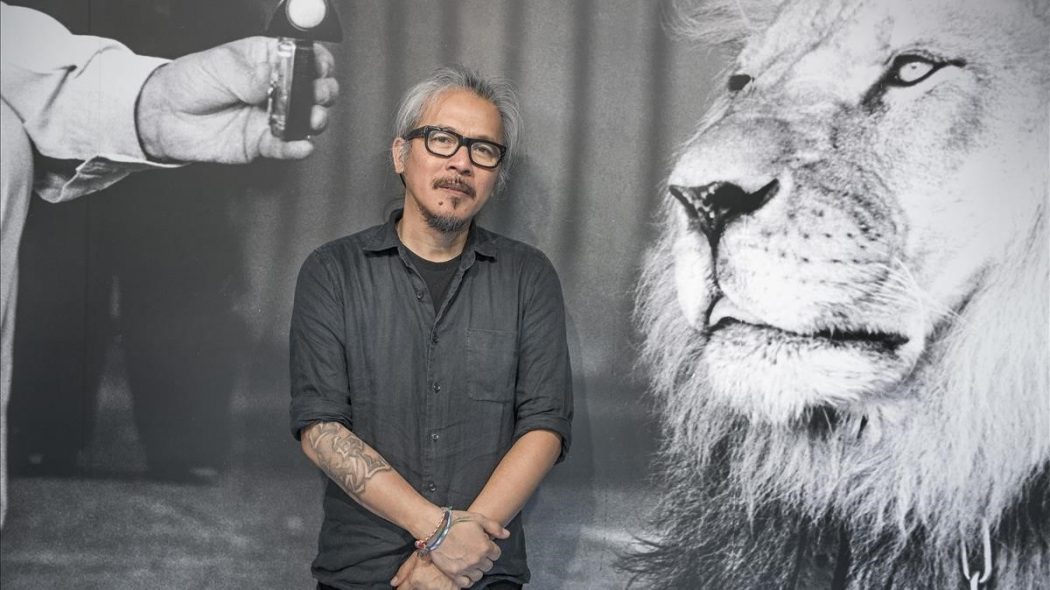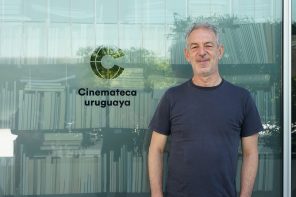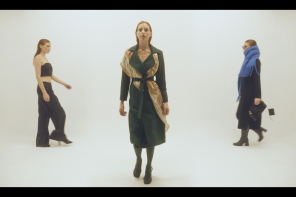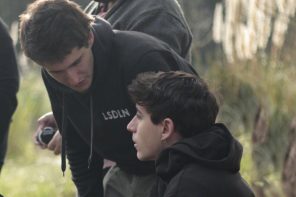Tenemos la suerte de contar con dos corresponsales y estudiantes de cine en EICTV (Escuela Internacional de Cine y Televisión) de San San Antonio de los Baños, Cuba. Allí, en las funciones exclusivas y encuentros con realizadores de todo el mundo, Malandro y Daniel Delgado Saucedo, se encontraron con uno de los maestros del cine filipino. Esto fue lo que ocurrió.
Traducción: Jaime Osvaldo
No habíamos dormido demasiado, la función de Ang Huoa (The Halt) (selección oficial de Cannes 2019) se extendió casi cinco horas. Lav nos citó a las seis en punto: y así amanecieron una uruguaya, un cubano, y un puertorriqueño bostezando mate, mientras esperaban, al ritmo de un reggaetón venezolano que emanaba de alguna bocina madrugadora, a que el ganador del León de Oro filipino apareciera por entre alguna de las tantas columnas que nublaban nuestra visión del horizonte.
A nuestras espaldas la luz naranja del sol del caribe comenzaba a dar fe del paso del tiempo. La circunstancia no podía ser más surreal, la espera tortuosa.
Pasadas las seis y media la yerba mate había hecho su efecto, estábamos despiertos y ansiosos, preocupados, desencantados. Era obvio que Díaz no iba a llegar, decidimos irnos a desayunar. Justo cuando comenzamos a recoger nuestras cosas, un hombre sonriente, de aspecto juvenil, emergió del fondo de uno de los pasillos, surcándolo a toda velocidad. Dijo tres cosas: Necesito un café, buenos días, tengo veinte minutos; en ese orden. Nos dividimos las tareas, a toda prisa, habíamos apartado una mesa con vista al amanecer que ya estaba bastante avanzado. Lav tenía el rodaje que culminaba su taller de la EICTV en media hora, pero con extrema gentileza y disposición escuchó todas nuestras preguntas.
Justo antes de responder nuestra entrevista hizo la suya, indagó nuestros países, nuestras especialidades en la escuela, nuestra relación con el enclaustro académico, su obsesión por la libertad salió a relucir, intercambió sus opiniones al respecto, sonrió varias veces. Justo antes de responder el cuestionario levantó la vista hasta el sol naranja que le coloreaba el rostro y pensó en voz alta: “parece como si fuera el último amanecer”.
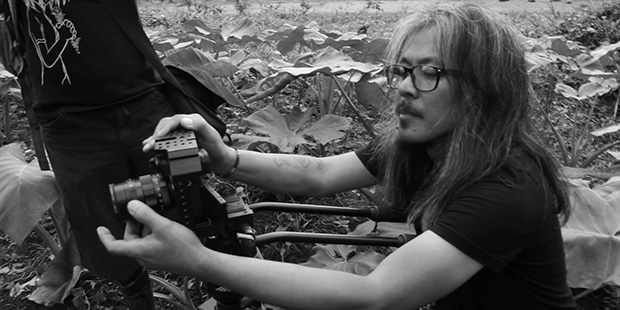
Hemos leído en varios artículos que usted es el Padre Ideológico del cine Filipino. Nos gustaría saber cual es la ideología del cine filipino.
Esa idea fue creada en Venecia hace unos años atrás, en el tiempo en que todavía habían algunos cines mostrando mis películas largas. Crearon la idea de que soy el padre ideológico del cine filipino, lo cual no soy, porque nunca a habido un movimiento de esa forma en las filipinas. Porque en realidad, como en cualquier movimiento de cine alrededor del mundo, no es algo organizado sino que es más un efecto de la revolución digital. Por está razón muchos pobres cineastas fueron liberados, emancipados de las garras de los sistemas de estudio. Debido a que soy uno de los primeros que empezó a hacer esto empezaron a darme esa designación. Sí, claro… ese es el asunto.
Hay un movimiento, de alguna forma, porque debido al digital los cineastas finalmente fueron liberados, emancipados. Somos dueños de la guitarra ahora, somos dueños del lápiz, somos dueños de nuestras mismas herramientas ahora, no como antes que para filmar tenias que lidiar con un sistema de estudio o incluso buscar a alguien para financiar tu película. Ahora agarras una cámara barata —cámara digital— y puedes empezar a hacer cine. Lo cual es más practico, más dialéctico porque puedes investigar fácilmente lo que busques. Sin tener que responderle a un poder importante o un poder colonial o una persona imperial que dicta cualquier cosa que hagas, ahora eres libre. Gracias al digital, de cierta forma. Si, ese seria el origen de esa etiqueta.
Lav: well that was created in Venice years ago, during the time there was still some cinemas showing the long films, created the idea that I am the ideological father of the new filipin cinema which i am not because theres have never been a movement like that in a filipins because just like in any cinema movement all over the world its not really an organized thing, its more an effect of the digital revolution because of the kind of digital somehow most poor filmmakers where liberated,emancipated from the clutches of the studios systems so… because i am one of the very first few who started doing that, they started giving me that label … yeah, of couse, so yeh, that the issue .
there is a movement in a way because finally because of digital filmmakers where liberated, emancipated finally we own the guitar now, we own the pen, we own our own tool now and not just like before were before you could make a film you had to cope with a studio system or even have to find somebody to finance your film. now grab whith a cheap camera, digital camera you can start doing cinema which it is more practical in a way, more dialectical because you can investigate easily what your looking for. not beholding to some important power or a colonial power or an imperial you know persona who can dictated anything what you do, now you are free. because of the digital, in a way. so that the origin of the tagging of the label is from that.
Talking about freedom… Le hemos escuchado que su manera de filmar está relacionada con una manifestación de libertad, el tiempo en el que aborda su película, la posición de la camara, la forma de hacer cine… ¿No teme en algún momento convertirse en prisionero de esta libertad?
Si… Esa es una buena pregunta, porque hay una posibilidad, si eres débil, de que lo que estés haciendo si lo haces para obtener notoriedad, hará que te vuelvas dogmático. Yo no soy así, todavía estoy muy abierto con otros procesos en el cine. Todavía puedo hacer los cortes […] y los cortes rápidos, todavía puedo hacer otras formas. No estoy confinado a esta forma de hacer cine. Ahora es así porque mi articulación cinematográfica se me hace muy cómoda y mi perspectiva en el cine está muy articulada por este tipo de procesos de un solo cuadro, de tomas largas… pero todavía sigo muy abierto a otros procesos. Soy un loco por cualquier forma de cine.
yes… that question is very good cause theres a chance also if you are weak that what you are doing just because you attempt notoriety out of it you’ll become dogmatic on your part. i am not like that, im still very open with other you know, processes in cinema i can still the 5:10 the fast cuts i can still do any other form in a way. so im not confined to the kind of you know…this is just because my articulation of cinema now is very confortable and in a way my perspective in cinema is very much articulated by this kind of process the one frame, long takes kind of process but im open to any process im a sucker for any form in cinema.
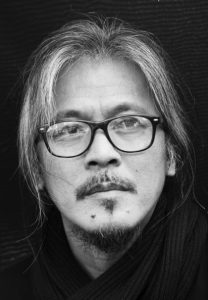
Una de las paradojas de la libertad que hemos observado en su obra es la extraña relación entre esta forma libre de contar películas y un contenido que muchas veces esta asociado a personajes privados de la libertad. ¿Cómo se articula estos dos entes contrapuestos?
Los personajes que estoy representando, personajes de mi cultura, especialmente mi cultura, que tiene esa historia de siempre y siempre buscar la libertad, ese personaje Filipino o personaje de Malay está eternamente buscando la redención, eternamente buscando la libertad. Si piensas en nuestra historia… sí, somos gente libre, pero empezando en el siglo XVI empezamos a experimentar el colonialismo de parte de España, se quedaron casi 300 años, y después el esquema Americano por más de 100 años. Luego, claro, y la ley marcial, la dictadura de Marcos y los Marcos por unos brutales 24 años, y luego la invasión japonesa de la Segunda Guerra Mundial, y ahora tenemos un presidente asesino nuevamente, un dictador. Como en cualquier cultura, los personajes Filipinos, el Filipino malay, está buscando la libertad sin parar, peleando por la liberación. Así que si, por ahí es que van los personajes que siempre represento en mis películas; no solamente por la libertad política, o nacional, espiritualmente también estamos buscándola porque somos un alma combatiente, nuestra psiquis esta muy fracturada por esto, el trauma del colonialismo, el trauma del imperialismo. Tenemos eso, el trauma de la dictadura, una psiquis que está muy fracturada y que tiene esa eterna y perpetua búsqueda de la emancipación.
the characters that I am portraying characters from my culture and very much so my culture has that history of forever and forever perennially seeking freedom. the filipino character o the Malayan character is eternally seeking redemption. eternalyl seeking freedom you base it on our history …yeah, we are a free people but starting in the 16 century they started really to experience colonialism out of Spain so they stay for more than 300 years and then the American scheme for more than a hundred years and then of course, and the martial law, 8:07 the dictatorship of marcos and the marcos for a brutal twenty-four years and then the japanese rade of world war 2 and now we have a very very murderous president again, a dictator so just like an another culture the filipino characters, the filipino Malay is always perennially seeking freedom, fighting for liberation so yeah there goes the character that I always portray in my films not just freedom politically or about national, spiritually we’re also was seeking that because we are such a battling soul our psychis is very much fractured by this, you know the trauma of colonialism, the trauma of imperialism, we have that, the traume of dictatiorship, a psyche that is very fractured so there is that eternal eternal and perpetual seeking of emancipation.
¿Creés que la vida es una prisión?
De alguna manera. Es el individuo quien va a determinar realmente cómo vivirá su vida. Tenemos estos conceptos de emancipación, de redención, de la felicidad, porque como bien sabes si eres un ser humano todos los días son muy tristes. Si estás triste sientes que el cielo está dentro de ti. La vida es una metáfora de una gran prisión, y tenemos que lidiar con ella todos los días, las mismas similitudes y vicisitudes de la vida, sabes que siempre está ahí y no puedes escapar. Es una lucha diaria, es una prisión formal. Todas las instituciones, todos los hábitats, o hogares por decirlo así son un tipo de prisión. De nuevo, no lo decimos de una forma derrogativa, es solo una imagen de eso y las dinámicas que los seres humanos viven entre los animales. De alguna manera, Cualquier hábitat es un tipo de prisión.
in a way. its the individual who will determine really how he will live his life in a way that is , you know, we have this concepts of emancipation of redemption, of happiness of you know… because, you know if you are a human being you know that every day is very sad. If you’re sad you feel that 9:34 that the heaven is in you and yeah. Life is a metaphor for that a big prison house and we have to deal with it every day, the very similitude and vicissitudes of life , you know its always there and you cant escape so its an every day struggle, its a formal prison in a way, all institutions, all habitats, or all abode so to speak is a kind of prison you know… again not we’re not saying in a delegator way. its just an image of that and the kind of dynamics where human beings live within animals. any habitat its a kind of prison in a way .
En sus películas puede verse un acto de compromiso social que está asociado normalmente con una absoluta fidelidad con la verdad. ¿Qué lugar hay para la mentira dentro de tu cine?
Pienso que esto es lo más esencial, el rol más fundamental del artista. Siempre luchando por estar cerca a la verdad, y ese es el principio de mi cine. Siempre lucho por estar cerca a la verdad en toda cosa que hago. Cualquier ser humano debería de luchar por eso todos los días, y los artistas, o incluso los políticos deben de estar en esa lucha. Somos confrontados por mentiras todos los días, y es un veneno para la cultura. Así que sí, este es el rol más esencial del artista: estar cerca de la verdad.
i think this is the most essential, the most fundamental role of the artist. always just to struggle to be near the truth and thats the principal of my cinema. i always struggle to be near the truth in everything that i do, any human being must struggle to be on that every day and the artists or even the politicians must be on that struggle we are confronted by lies everyday and its poison to culture so yeah this is the most essential role of artist to be near the truth
Borges dijo “No hay hombre que al cabo de un día no haya mentido con razón muchas veces”…
Eso es verdad, eso es otra verdad, pero hay niveles de verdad: la verdad esencial, las mentiras blancas que se dicen todos los dias…
Thats true, thats another truth but there are levels of truth, the essential truth and the white lies that you do every day…
¿No cree que el culto de la verdad es exacerbado muchas veces?
Sí claro, es el ejercicio del discurso más abusado en todas las cosas que hacemos. El ejercicio más abusado desde la misma discusión de la existencia, a la política, a la enseñanza, a predicar teología, la palabra más abusada es la verdad. ¿Qué es la verdad? ¿Qué es la verdad siempre?… pero la lógica te puede decir qué es la verdad, porque siempre pensamos en lo que es esencial… ¿sabes?…
Yes of course it is the most abuse exercising on discourse in everything that we do. the most abuse exercise from the very discussion existence to doing politic, to teaching to preaching theology the most abused word is truth. what is the truth? what is the truth always…. but logic can tell you what is the truth because we always thinkabout what its esencial… you know…
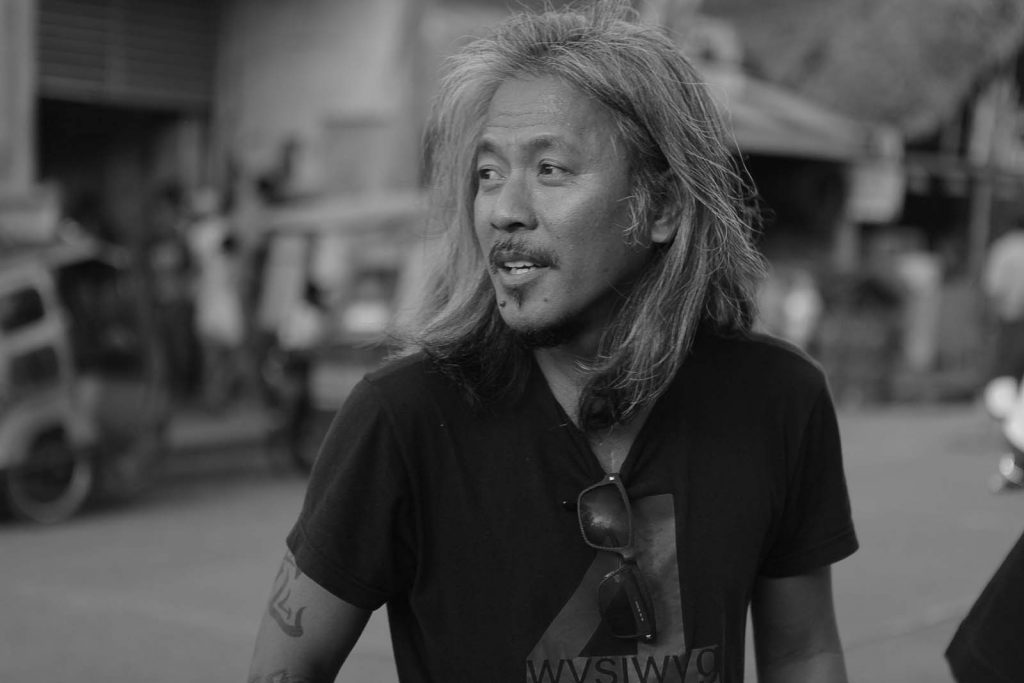
Borges también decía que el olvido es la única venganza y el único perdón. Algunos de sus personajes para seguir adelante deben olvidar y otros ser olvidados ¿Cree que hay justicia en el olvido?
¡Qué cita! Si…Pienso que eso es la lucha humana, siempre buscamos eso. Para las personas traumatizadas el único escape es olvidar… si… de una forma muy MUY meta, olvidar es una cuerda que necesitamos, que las personas necesitan porque no encuentran respuestas, no encontramos respuestas y esa es la manera más concreta de sobrevivir… perdonar o ser perdonado… el olvido de cierta forma. La manera en que Borges dice que es, ese tipo de soledad que el hombre se impone a si mismo por culpa del ciclo vicioso de la vida. Así que sí… perdonar en teología o en cualquier religión, perdonar es siempre la llave a la redención. Pero es muy abstracto. ¿Qué es el perdón? ¿Es justicia? Cómo en el caso de la dictadura de Marcos, el mató muchas personas, vació nuestro país, muchas personas desaparecieron, muchos activistas y presuntos comunistas fueron torturados y asesinados… Muchas personas lo perdonan, ¿pero eso es justicia? ¿Es perdón? ¿Este tipo de perdón es justicia? ¡No! La justicia social va más allá del asunto del perdón, de la verdad, de tu corazón. Debemos castigar a Marcos, eso es justicia. Debe ser concreto. Por eso es que el perdón es muy abstracto… muy abstracto.
What a quote … yeah… I think its the human struggle, we always seek that. Traumatized people the only way to scape its to forget… yeah… and another escape its well… in a very very meta way forgiving its a thread that we need, people need because they don’t find answers, we don’t really find answers so, its the most concrete way to survive you know…to forgive or be forgiven yeah… oblivion in a way… the way borges say its the kind of solitude that man imposes on himself because of the vicious cycle of life. so yeah… forgiving in theology or in any religion forgiving its the key to redemption always… but it is very abstract. what is forgiveness? is it justice? like in the case of the dictatorship of Marcos he killed a lot of people, he plundered our country many people disappeared, many activists and suspected communists where tortured and killed a lot of people forgive him but is it justice? is it forgiveness? the kind of forgiveness is justice? No! social justice goes beyond the issue of forgiveness, truth, your heart it’s more you now we must punish Marcos, that’s justice. it must be concrete thats why forgiveness its very abstract… very abstract …
¿Entonces existe o no existe el olvido?
Bueno, la gente lo hace… lo experimentamos, el perdón, pero es otro concepto de la existencia, así como la felicidad es un concepto… así como la libertad es un concepto. Depende de ti, en tu propia dialéctica, formar este concepto… este concepto muy abstracto… de […] la existencia… Siempre hay una lucha por encontrar significado, de encontrar respuestas, pero esto son cosas muy abstractas acerca de la existencia… es algo del día a día.
well people do it… we experience it forgiveness but it is another concept about existence just like happiness its a concept … just like freedom its a concept… its up to you who in your own dialectical way to form this concept… this very abstract concept… of you know […] existence… there’s always a struggle to find meaning, to find answers… but this are very abstract things about existence, its an everyday thing.
Su obra ha sido ampliamente reconocida en grandes festivales del mundo que nadie ignora que son los que legitiman el valor de la obra de los autores. ¿Cómo se interrelaciona la función social de su cine con estas películas estrenadas en Europa? ¿Qué valor le atribuye a los festivales y a los premios?
(Lav se ríe) Esto es una gran pregunta… Si… Siempre es una gran pregunta… Esa es la paradoja de hacer cine ahora porque el cine serio no se ve. Tenemos que admitir eso. Solo los intelectuales, los festivales académicos y programadores pueden ver trabajos serios ahora. Así que este foro vive para nosotros. El cine digital en cierta forma es muy paradójico porque el cine debe conectar más allá de los festivales, más allá de las cinematecas, más allá de las escuelas de cine, más allá de los circuitos de teatro. El cine del siglo XXI debe atraer más allá, de forma socrática. Debe ser afuera, en las plazas, en las comunidades [grassroots]. Debe educar a las masas, ese debe ser el foro apropiado ahora. Pero, ¿cómo podemos hacer eso? ¿Cómo puede el cine hacer eso? Esa es la lucha ahora. Puedo ver el enigma de ir a grandes festivales y me siento culpable. Soy culpable de eso, y siempre me siento mal. Por ejemplo, hoy mi película tendrá su estreno, su estreno mundial, en Cannes, pero anoche lo hicimos aquí. De nuevo, eso es un gran problema. ¿Cómo conectamos? ¿Cómo creamos un cine que sea más y que enriquezca a las masas? Esa es la clave ahora, el compromiso es la clave ahora. Las escuelas de cine son cool, los festivales son cool, pero debemos salir afuera y educar a las masas. Quieres salvar al mundo pues la clave esta en las masas: edúcalas, apoya ese tipo de educación porque sino solo será un ciclo vicioso. Tendremos los Putins, y los Marcos, y los Trumps por toda la historia, y la historia de la humanidad será un sufrimiento perpetuo.
(Lav laughes) This is a big question… Yes… Its always a big question… thats the paradox of doing cinema now because serious cinema really is not seen. we have to admit that. only intelectuals, the academia festivals and programers can see serious works right now . So this forum lives for us. Digitalized cinema in a way is very paradoxical because cinema must engage more beyond the festivals, beyond the cinematecs, beyond the film schools, beyond the theater circuits, like the 21 century cinema must be engage beyond that. the socratic way. it must be outside, in the plazas, in the grassroots. it must educate de masses. that must be the proper forum now but how can we do that? how can cinema do that? thats the struggle now. i can see the big big conundrum of doing big festivals and i feel guilty on that. I am guilty of that and i feel bad always… Like today my film will be premiered have its world premiere in Cannes but we did it last night here, again its a big problem… you now…. how do engage how do we create cinema thats its more, that ill enrich the masses, thats the key now, engagement is the key now , film schoosl are cool, festivals are cool , we must go out and educate the masses, you wanna save the world thenthe key is the masses, educate them, sustain that kind of education otherwise its going to be just a vicious cycle we will all have the Putins, and the Marcoses, and the Trumps all over history and mankinds history its gonna be a perpetual suffering
La música tiene 5000 años, el teatro 27 siglos. El cine apenas un siglo.
Si, si… es muy joven.
Yes, yes…its very young
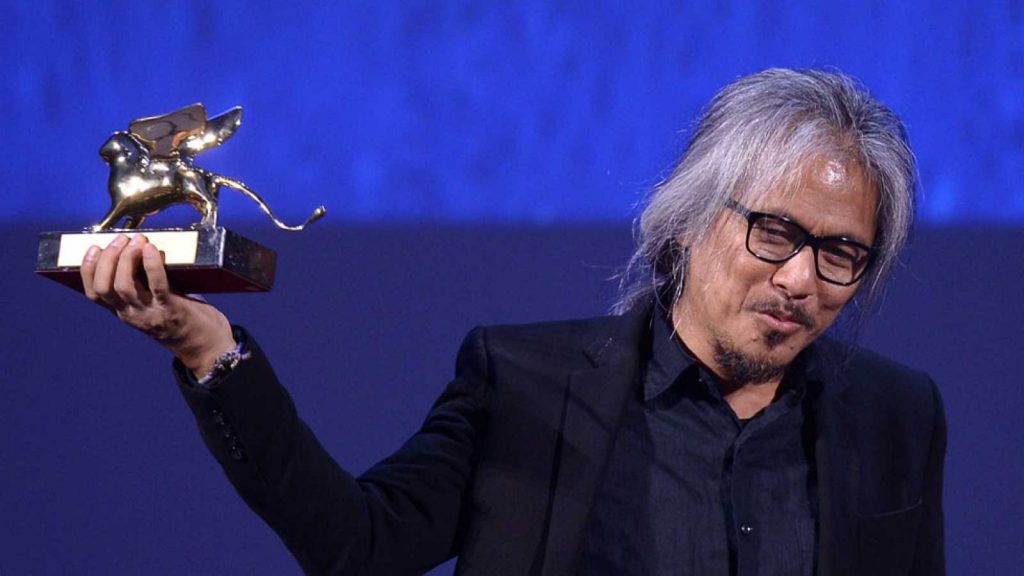
¿Entonces cuál crees que es el futuro del cine?
¿El futuro del cine? Será uno de los medios más poderosos, será el medio más poderoso realmente. Si lo usamos bien, si realmente lo usamos. Es muy abarcador: el cine puede estar en todas partes ahora, el cine es la vida ahora. Tienes el teléfono, tienes cualquier cosa y puedes hacer cine, pero más allá de eso la creación del buen cine debe comenzar, y vuelvo de nuevo a esto, que si el cine va a tener un futuro debe volverse un cine que sea para conectar, para la educación. Debe ser una herramienta para la emancipación, para la redención, para la libertad, para cualquier cosa de liberación. Los movimientos de liberación deben usar el cine porque su poder de educar y de realmente agarrar la psiquis de las personas. Es importante, pero si, depende nuevamente de lo que haga el individuo cineasta. El arte es muy estructurado de alguna forma.
The future of cinema?… it will be a very powerful medium… it will be the most powerful medium really, if we use it well if we really really use it, it is very encompassing. cinema can be everywhere now cinema is life now, you have the cellphone, you have anything and you can do cinema but beyond that is the creation of greater cinema must begin again am going back to that.. if cinema will have a future then it must be that a cinema that is for engagement, for education for a tool, it must be a tool for emancipation, for redemption, for freedom for anything liberation. liberation movements must use cinema in a way because of its power to educate and to really you know… hold people’s psyche. its important but yeah again its on the individual filmmakers to do that. art is very structured in a way
Que es para usted el cine? Porque yo todavía no lo se…
Yo tampoco sé lo que es el cine, es mi pregunta todos los días, pero de verdad, mi pregunta todos los días es por qué estoy hacienda cine. Hago eso porque quiero mantener mi fe en el cine. Mientras pueda creer en eso, en que el cine puede efectuar algún cambio en cualquier individuo que ve mis trabajos, más allá del asunto su duración, del aburrimiento que la gente siente con mi cine. Todavía creo que puede efectuar un cambio y por eso todavía tengo fe en el cine. Es todavía una iglesia a la cual quiero ir. Es una lucha diaria, me cuestiono el hecho de ser un cineasta todos los dias. ¿Porque hago cine? Esa es mi pregunta siempre, porque realmente no entiendo el cine, es solamente una herramienta para yo poder entender la vida.
I dont even know cinema too, its my question every day but really my question every day its way am i doing cinema, I do that yo i want to maintain my faith in cinema… just as long as i believe on that… that cinema can still affects change on any individual that see my works beyong the issue of its duration the boredom that people feel in my cinema i still believe that it can affect change so i still have faith in cinema. it is still a church that a wanna go to… its an everyday struggle, I quesiton my being a filmaker eveyrday. why am i doing cinema thats is my question always because i don’t really understand cinema it is just a tool for me to understand life.
Thank you very much Lav!
Thank you, i run!
Gracias, corro!
Y Lav se fue corriendo…

